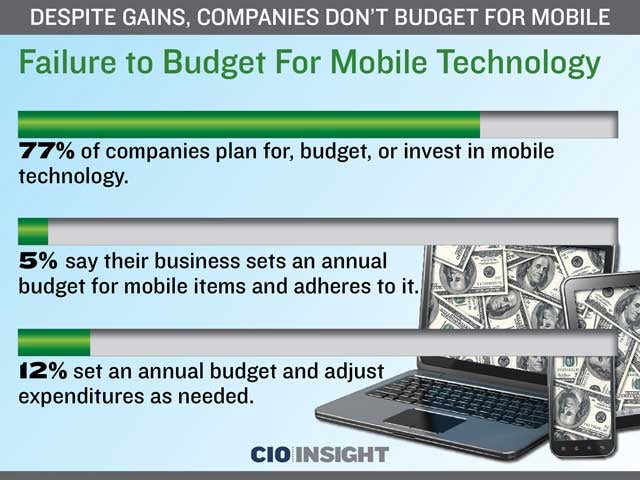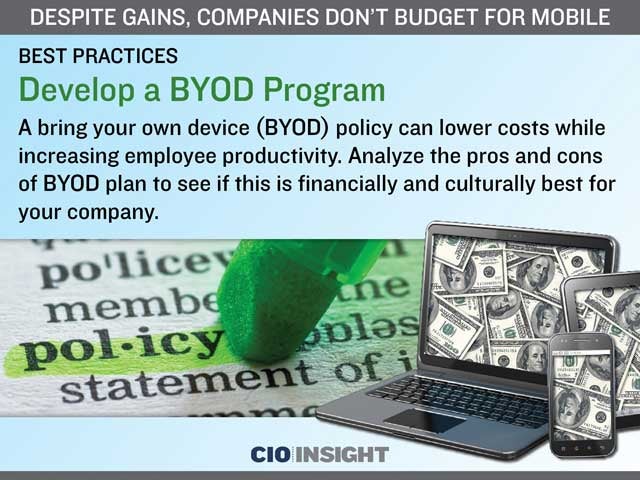
Despite Gains, Companies Don’t Budget for Mobile
 Who Supplies What
Who Supplies What
Companies are slightly more likely now, compared to 2013, to let employees buy mobile devices for company business and not reimburse them. 54% of companies surveyed supply mobile devices to their employees, lower than last year (69%).
 Which Mobile Devices Are Preferred
Which Mobile Devices Are Preferred
Respondents are positive about the effect of mobile technology on their company’s productivity. Most commonly mentioned were desktop computers (73%), followed by laptops (68%) and smartphones (68%). Fewer consider tablets to have as positive an effect on productivity (47%).
 Key Benefits From Mobile
Key Benefits From Mobile
Executives say mobile is most useful for: contact with employees anytime, anywhere, reducing time spent commuting to office, meeting clients’ needs by providing in-home and off-site service
 Top Five Positive Effects of Mobile Technology
Top Five Positive Effects of Mobile Technology
The areas in which mobile technology produces a positive effect: Customer service: 70%, Conduct business during increment weather: 32%, Brought more work to the company: 21%,Able to conduct remote meetings: 20%
 Failure to Budget For Mobile Technology
Failure to Budget For Mobile Technology
77% of companies plan for, budget, or invest in mobile technology. 5% say their business sets an annual budget for mobile items and adheres to it. 12% set an annual budget and adjust expenditures as needed.
 Most Popular Operating Systems
Most Popular Operating Systems
Use of Microsoft’s Windows dramatically increased since last year. 54% of respondents use Windows, up from 36% last year 50% use IOS, unchanged from last year The Android OS followed at 41%, a decline from 2013
 Best Practices: Empower Your Employees With Mobile
Best Practices: Empower Your Employees With Mobile
The Sage Survey advises executives to incorporate mobile devices and services that empower employees who interface with customers whether they work in the office, on the road or remotely.
 Best Practices: Track Your Equipment Expenses
Best Practices: Track Your Equipment Expenses
Consider replacing older, slower, less mobile desktops with laptops, tablets and smartphones. After evaluating your current hardware, create a budget for buying mobile devices and services to improve productivity.
 Best Practices: Budget for Mobile
Best Practices: Budget for Mobile
The report recommends adding mobile to the annual budget so that employees can be very productive, regardless of their location and other factors.
 Best Practices: Develop a BYOD Program
Best Practices: Develop a BYOD Program
A bring your own device (BYOD) policy can lower costs while increasing employee productivity. Analyze the pros and cons of BYOD plan to see if this is financially and culturally best for your company.
 Best Practices: View Mobile as an Investment
Best Practices: View Mobile as an Investment
As you develop your budget, consider mobile technology an investment rather than an expense. Add mobile to several budget categories so that it can better support business outreach and drive growth.